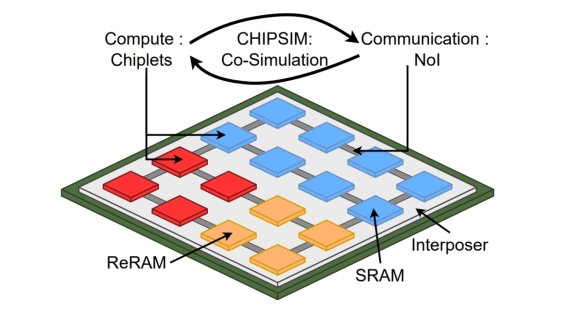CHIPSIM: A Co-Simulation Framework for Deep Learning on Chiplet-Based Systems
By Lukas Pfromm 1, Alish Kanani 1, Harsh Sharma 2, Janardhan Rao Doppa 2, Partha Pratim Pande 2, Umit Y. Ogras 1
1 University of Wisconsin–Madison, Madison, WI, USA,
2 Washington State University, Pullman, WA, USA

Abstract
 Due to reduced manufacturing yields, traditional monolithic chips cannot keep up with the compute, memory, and communication demands of data-intensive applications, such as rapidly growing deep neural network (DNN) models. Chiplet-based architectures offer a cost-effective and scalable solution by integrating smaller chiplets via a network-on-interposer (NoI). Fast and accurate simulation approaches are critical to unlocking this potential, but existing methods lack the required accuracy, speed, and flexibility. To address this need, this work presents CHIPSIM, a comprehensive co-simulation framework designed for parallel DNN execution on chiplet-based systems. CHIPSIM concurrently models computation and communication, accurately capturing network contention and pipelining effects that conventional simulators overlook. Furthermore, it profiles the chiplet and NoI power consumptions at microsecond granularity for precise transient thermal analysis. Extensive evaluations with homogeneous/heterogeneous chiplets and different NoI architectures demonstrate the framework's versatility, up to 340% accuracy improvement, and power/thermal analysis capability.
Due to reduced manufacturing yields, traditional monolithic chips cannot keep up with the compute, memory, and communication demands of data-intensive applications, such as rapidly growing deep neural network (DNN) models. Chiplet-based architectures offer a cost-effective and scalable solution by integrating smaller chiplets via a network-on-interposer (NoI). Fast and accurate simulation approaches are critical to unlocking this potential, but existing methods lack the required accuracy, speed, and flexibility. To address this need, this work presents CHIPSIM, a comprehensive co-simulation framework designed for parallel DNN execution on chiplet-based systems. CHIPSIM concurrently models computation and communication, accurately capturing network contention and pipelining effects that conventional simulators overlook. Furthermore, it profiles the chiplet and NoI power consumptions at microsecond granularity for precise transient thermal analysis. Extensive evaluations with homogeneous/heterogeneous chiplets and different NoI architectures demonstrate the framework's versatility, up to 340% accuracy improvement, and power/thermal analysis capability.
Index Terms — Chiplets, Heterogeneous integration, Cosimulation, Deep neural networks (DNNs), Thermal modeling
To read the full article, click here
Related Chiplet
- Interconnect Chiplet
- 12nm EURYTION RFK1 - UCIe SP based Ka-Ku Band Chiplet Transceiver
- Bridglets
- Automotive AI Accelerator
- Direct Chiplet Interface
Related Technical Papers
- Muchisim: A Simulation Framework for Design Exploration of Multi-Chip Manycore Systems
- CATCH: a Cost Analysis Tool for Co-optimization of chiplet-based Heterogeneous systems
- AuthenTree: A Scalable MPC-Based Distributed Trust Architecture for Chiplet-based Heterogeneous Systems
- On hardware security and trust for chiplet-based 2.5D and 3D ICs: Challenges and Innovations
Latest Technical Papers
- LaMoSys3.5D: Enabling 3.5D-IC-Based Large Language Model Inference Serving Systems via Hardware/Software Co-Design
- 3D-ICE 4.0: Accurate and efficient thermal modeling for 2.5D/3D heterogeneous chiplet systems
- Compass: Mapping Space Exploration for Multi-Chiplet Accelerators Targeting LLM Inference Serving Workloads
- Chiplet technology for large-scale trapped-ion quantum processors
- REX: A Remote Execution Model for Continuos Scalability in Multi-Chiplet-Module GPUs